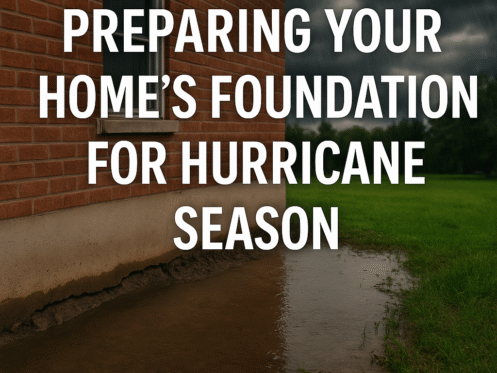Why Hurricane Season Threatens Foundations in North Carolina
From heavy rainfall and storm surges to strong winds, hurricane season in North Carolina can wreak havoc on your home’s foundation. Excess moisture, soil erosion, and flooding place immense stress on structures, leading to cracks, settlement, or even long-term damage.
The good news? With the right preparation, you can fortify your foundation before the storm hits. Here’s how to protect your home and keep it standing strong.
1. Inspect for Existing Foundation Issues
Start by checking your foundation for signs of weakness, including cracks, gaps, or water seepage. Small issues become big problems when exposed to hurricane-force rains and flooding.
✅ Tip: Schedule a professional foundation inspection before storm season for peace of mind.
2. Improve Drainage Around the Home
Hurricanes bring heavy, sustained rainfall. Poor drainage allows water to pool around your foundation, increasing hydrostatic pressure and the risk of leaks.
Clean gutters and downspouts.
Extend downspouts at least 6–10 feet away from your home.
Regrade soil so water flows away from the foundation.
✅ Tip: Consider installing a French drain or sump pump system for added protection.
3. Seal and Waterproof the Foundation
Waterproof coatings and sealants on basement or crawl space walls help block excess moisture. Interior drainage systems paired with vapor barriers add an extra layer of defense against floodwaters.
✅ Tip: Crawl space encapsulation is one of the best investments for storm-prone areas in North Carolina.
4. Reinforce Basement and Crawl Space Walls
High winds and saturated soil can create hydrostatic pressure, forcing basement walls inward. Reinforcements such as carbon fiber straps or steel beams can stabilize walls and prevent movement during storms.
✅ Tip: Proactive reinforcement is less costly than repairing a collapsed wall.
5. Protect Against Soil Erosion
Hurricane flooding can wash away soil around your foundation, leaving it exposed and unstable. Erosion control methods—like landscaping with proper grading, retaining walls, or drainage swales—help keep soil in place.
✅ Tip: Plant deep-rooted shrubs or grasses around your home to stabilize soil naturally.
6. Secure Outdoor Structures
Decks, patios, and concrete slabs near your foundation can shift or crack during hurricanes if the soil beneath them erodes. Polyurethane foam injections can stabilize these slabs and prevent further movement.
✅ Tip: Address uneven slabs or sinking concrete before storm season begins.
Be Storm-Ready: Protect Your Foundation Now
Your foundation is your home’s first line of defense against hurricanes. By taking proactive steps—inspection, drainage, waterproofing, and reinforcement—you can minimize risks and save thousands in potential repair costs.
📞 Call RhinoLift Foundation Solutions today for a free hurricane-season foundation inspection and get your home storm-ready.

